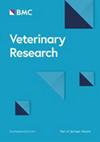Exosomal ssc-miR-1343 targets FAM131C to regulate porcine epidemic diarrhea virus infection in pigs
IF 3.5
1区 农林科学
Q1 VETERINARY SCIENCES
引用次数: 0
Abstract
The porcine epidemic diarrhea virus (PEDV) causes diarrhea in piglets, thereby causing very significant economic losses for the global swine industry. In previous studies, it has been confirmed that microRNAs (miRNAs) play an important role in the infection caused by PEDV. However, the precise molecular mechanism of miRNAs in the regulation of PEDV infection is still not fully understood. In the present study, we utilized miRNA-seq analysis to identify ssc-miR-1343 with differential expression between PEDV-infected and normal piglets. The expression of ssc-miR-1343 was detected in isolated exosomes, and it was found to be significantly higher than that in the controls following PEDV infection. The ssc-miR-1343 mimic was found to decrease PEDV replication, whereas the ssc-miR-1343 inhibitor was observed to increase PEDV replication, and ssc-miR-1343 was delivered by exosomes during PEDV infection. Mechanistically, ssc-miR-1343 binds to the 3′UTR region of FAM131C, down-regulating its expression, and FAM131C has been shown to enhance PEDV replication through simultaneously suppressing pathways associated with innate immunity. The ssc-miR-1343/FAM131C axis was found to upregulate the host immune response against PEDV infection. In conclusion, our findings indicate that the transport of ssc-miR-1343 in exosomes is involved in PEDV infection. This discovery presents a new potential target for the development of drugs to treat PEDV.外泌体ssc-miR-1343以FAM131C为靶调节猪流行性腹泻病毒感染
猪流行性腹泻病毒(PEDV)会导致仔猪腹泻,从而给全球养猪业造成巨大的经济损失。以往的研究已经证实,微RNA(miRNA)在PEDV感染中发挥着重要作用。然而,miRNAs 在调控 PEDV 感染中的确切分子机制仍未完全清楚。在本研究中,我们利用 miRNA-seq 分析鉴定了在 PEDV 感染仔猪和正常仔猪之间有差异表达的 ssc-miR-1343。在分离的外泌体中检测到了 ssc-miR-1343 的表达,发现它在 PEDV 感染后的表达明显高于对照组。研究发现,ssc-miR-1343模拟物能减少PEDV的复制,而ssc-miR-1343抑制剂则能增加PEDV的复制。从机理上讲,ssc-miR-1343 与 FAM131C 的 3′UTR 区域结合,下调其表达,而 FAM131C 已被证明可通过同时抑制与先天免疫相关的途径来增强 PEDV 复制。研究发现,ssc-miR-1343/FAM131C 轴可上调宿主对 PEDV 感染的免疫反应。总之,我们的研究结果表明,外泌体中ssc-miR-1343的转运参与了PEDV感染。这一发现为开发治疗 PEDV 的药物提供了一个新的潜在靶点。
本文章由计算机程序翻译,如有差异,请以英文原文为准。
求助全文
约1分钟内获得全文
求助全文
来源期刊

Veterinary Research
农林科学-兽医学
CiteScore
7.00
自引率
4.50%
发文量
92
审稿时长
3 months
期刊介绍:
Veterinary Research is an open access journal that publishes high quality and novel research and review articles focusing on all aspects of infectious diseases and host-pathogen interaction in animals.
 求助内容:
求助内容: 应助结果提醒方式:
应助结果提醒方式:


